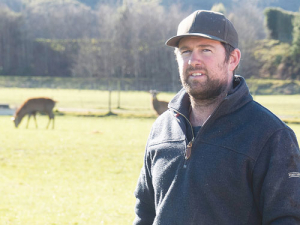The Rabobank Farm Management Project (FMP) award is made for the best project arising from the previous year’s Rabobank Farm Managers Programme. The aim is to develop and enhance business management skills in young farmers from various agricultural sectors in Australia and New Zealand.
As a graduate of the 2017 FMP, Brook presented his project at this year’s programme, outlining how he had taken on the lessons and applied them to his farming operation. He received the award and a $2000 prize at a dinner in Adelaide in late June attended by this year’s FMP graduates, industry leaders and senior Rabobank staff.
Brook, with his wife Kiri, manages Rupert Red Deer, a 324ha stud stock and velvet operation on two properties in Peel Forest, South Canterbury.
He said his attendance at the 2017 FMP had “lit a fire” under him to develop a new business plan including short- and long-term goals.
“One of the outcomes of developing the business plan was to start our own stud brand – Rupert Red Deer – selling our top genetics as sire animals and selling our surplus young stock,” he told Rural News.
“Having our first sale did two things: it increased our profit on selling our surplus stock and opened our eyes to what our stock were potentially worth.”
The operation was begun 15 years ago by Kiri’s parents Martin and Rikie Rupert. Brook came in as partner and manager four years ago. They now run stags on the original 180ha block, while hinds are run on a nearby 144ha block bought by the Ruperts in 2011.
Brook says the FMP taught him the importance of analysing the farm performance and understanding what makes things go well or not. He had been impressed by a presentation by Tasmanian cheesemaker Paul Bennett who stressed, ‘you have to know all your numbers to be able to make decisions on the spot.’
“We have to analyse what we’ve got and what we’re doing,” Brook says.
Among the changes he is implementing is a large project to re-fence and reorganise the paddocks, putting in laneways so they no longer have to “play chess” with several mobs to move a single mob across several paddocks to the shed.
They are now also planning a further expansion of their operation, having realised – through their computer analytics – that they could improve fawning percentages by running hinds on less productive land.
“One thing we discovered by doing this analysis was the land we were using for our first fawning hinds was holding us back in producing our best genetics due to the fact hinds tend to get too fat on the highly productive paddocks we were using,” Brook explains.
Other farmers were getting better results when hinds were on lesser country.
“We’ve recently taken our numbers and financial budgets to the bank and have successfully obtained the money we need to purchase a property with the right land class and contour.”
The operation runs about 750 each of stags and hinds, plus 450 dairy heifers used to clean up surplus grass.
“Deer enjoy eating the nice fresh-growth grass, then the heifers come second and get to eat all the rougher stuff,” Brook says. “We don’t push the deer hard at all so they’re always getting the cream of the crop.”
He says the operation is all about velvet genetics.
“It’s all weight and conformation of the antler. The antler has a shape to it and we’re after a specific shape and that’s what we go for.”
The antlers, harvested from October each year, average 7kg a set and are sold to Korea and China.
They cut ‘spikes’ from first year stags and the first proper antlers from two year-olds, when they decide which animals to keep and which to sell to other velveters.
Brook says the current velvet price is “very good.”
“The last couple of seasons have been very strong, and it’s been steady the past four or five years, at a high.”
On the stag block, the animals are run in age group mobs. Winter feeding includes high quality silage and a daily fodder beet break. Brook says run-off paddocks allow them to “chill out on grass and have their own space”.
Older animals – the “gummies” which can no longer manage beet bulbs – stay on grass and silage.
Meanwhile, the two-year-olds are “just too curious and stroppy” to be contained by break fencing so they get beet lifted and fed to them in their paddocks.
“They’re like little teenagers; they wreck fences and all sorts continuously,” says Brook.
He also feeds PKE coming into growth stages, especially in drier times. It is a full dryland property with no irrigation, but nestled in the foothills where it catches about 1000ml of rain a year.
“If this place here goes dry you can guarantee Canterbury is an absolute dustbowl,” he says.
Born and raised in nearby Geraldine, Brook was workshop foreman of a local engineering outfit before taking on the farm. He says deer demand the highest stockmanship.
“You’ve got to have your wits about you being a deer farmer. One minute they’re nice and calm and the next they’re climbing up the walls.”









